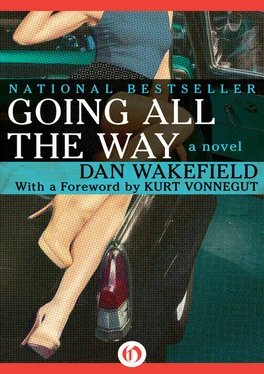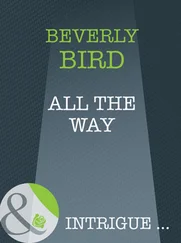“Sure I was in the Varieties,” Marty admitted; then added, “Jews were allowed.”
“Hey!” Gunner said, like he’d caught her in a foul. “Don’t give me any discrimination stuff. Jews were in everything at Shortley, even the best clubs, even in—well, the Big Rod cliques. In every class, all the time I was there, anyway. In my year there was Sue Ann Glick, and Sammy Katzman.”
“Sure.” Marty smiled. “And in my year there was Roberta Tallon and Norm Siedenbaum.”
“So?”
“So, in every year, in every class, one male and one female Jew are taken in at the top. That’s what the quota allows.”
“ What quota?” Gunner demanded.
Marty sighed and then said, as if she were only repeating the obvious, “The quota that allows two Jews, one of each gender, to be among the top social caste at Shortley in each new class.”
Gunner snorted. “That’s crazy,” he said and turned to Sonny, looking for help. “Tell her, will ya? You’re an objective observer. Was there a ‘quota,’ did you ever hear of any ‘quota’ like that?”
Sonny chewed at his lip. “Not that I ever heard of,” he said.
That was true, but the funny thing was when he started thinking back, it seemed like Marty was right. In every class there turned out to be a dozen or so boys and a matching number of girls who were really the top, the real rods and roddesses, and in each group there was just one boy and one girl Jew. Sonny had never really noticed it before, but when he thought about it, damned if it didn’t seem to be the case.
“Well?” Marty asked.
“It seems like that’s what happened,” Sonny said.
Gunner slapped a hand on his forehead and looked from Marty to Sonny. “But how? ” he insistently questioned them. “ How did it happen?”
Marty blew a neat little smoke ring at him. “Natural selection,” she cooed.
Gunner’s hand tightened on his forehead, pressing the brow.
“No, but really. How did each top group in each class always have two, no more and no less? Always one boy and one girl who were—” his voice trailed off—“Jewish.”
“To show that all men are created equal,” Marty said brightly, “regardless of race, creed, or color.”
“But listen,” Gunner pleaded, “nobody ever said that. I mean, I was on the inside of that stuff, and I swear to God, nobody ever sat down and said, ‘O.K., who’ll be the two Jewish kids to make it this year?’ You don’t believe that happened. Do you?”
Marty shrugged. “Probably not. That would have been embarrassing.”
Gunner looked to Sonny, but he wasn’t any help. “Son of a bitch,” Gunner said softly. He kept holding his hand pressed to his forehead, as if he was keeping his brains from falling out. Finally he let out a long breath and said, almost like he was talking to himself, “Wow. The stuff people do. And don’t even know they’re doing it.”
Marty reached over and touched his hand, not so much with affection, but rather, consolation, as if she were comforting a little kid.
“We did it too,” she said. “The Jews had their own vicious social thing going, their own clubs and in groups and nasty little hierarchies.”
“Besides,” Sonny found himself saying aloud, “you didn’t have to be Jewish to be on the outside.”
Marty gave him a sympathetic smile that made him look away and wished he hadn’t said it. It would have sounded even more like asking for sympathy if he added the thing he so often thought about, the feeling he had that it might in a way be lucky to be a Jew or something so you’d have a real reason for being shut out of things and it wouldn’t really be your fault, the fault of the actual person you were. It seemed to Sonny to be even more humiliating to be a regular WASP and still be left out, because then the only reason for not being accepted was yourself, the way you were. You got to wondering whether you had B.O. or something, like in the ads where even your best friends wouldn’t tell you.
“I was a snob,” Marty said, “in my own circle. I was in Hadassah Debs. That was very big for the Jews.”
“Hadassah Debs,” Gunner said. “Yeh, I remember that. Did you join a Jewish sorority? In college?”
“I went to Wellesley. At least the cliques there didn’t have badges.”
“You went East, huh?” Gunner said with that certain edge of awe that the fact commanded from those who got their higher education nearer home.
Marty nodded and mashed out her cigarette with a determined jab. “I’m going back, too.”
“When?” Gunner’s question had a note of urgency about it.
“When I serve my time here. Daddy’d let me go now, but Mother thinks if I stay a year I’ll meet a nice boy at the country club and grow up to be just like her. So I’m taking courses at Herron and painting, and if I stay a year I get my freedom. This time next year, I’ll be gone.”
“Where?” Gunner asked, leaning forward a little.
Marty looked puzzled, as if he ought to know. “New York, of course.”
“Oh, right.”
“Is there any place else?”
Gunner shrugged. “I might end up there myself,” he said casually. “I’ve got the GI Bill coming. I could use it anywhere. Columbia, maybe.”
“Oh? What would you study?”
Gunner shifted uneasily in his seat. “I dunno, exactly. Philosophy, maybe. Maybe something in art. Something to do with art.”
“Oh,” Marty said, obviously unimpressed. Sonny felt embarrassed in Gunner’s behalf, something he would never have imagined could happen. Marty yawned and said, “Well, thanks for the coffee. I have to run.”
She slid from the booth, a set of keys jangling in her hand, and started off.
“Wait!” Gunner almost pushed Sonny onto the floor as he scrambled out of the booth. Marty turned and looked at him with her eyebrows slightly raised, questioning, as if she couldn’t imagine what in the world Gunner might have to say to her. Sonny thought she looked exotically arrogant.
“Well,” Gunner said and cleared his throat. “Why don’t we, uh, get together sometime? I mean, you know, I’d like to talk to you again. There’s some stuff I’d like to talk to you about.”
“Oh?”
She damn well wasn’t making it easy. Sonny felt downright sorry for Gunner.
“Do you have a phone?”
“My father does. It’s in the book.”
She turned again, twitching off in that teasing walk. Gunner stood watching, in a kind of trance.
“Some girl,” Sonny said.
“It won’t be easy,” Gunner said, mostly to himself. Then, as if snapping awake, he looked wildly at Sonny and said, “Holy shit! What’s her father’s name?”
“She didn’t say.”
“Come on!”
Gunner dug in his pocket, pulled out an assortment of coins, and flung them all on the table. He ran out the door and looked desperately up and down the street. Then he started running and Sonny trotted behind, wanting to help. A new Chevy convertible was pulling out into traffic, and Gunner spotted Marty at the wheel, ran out in the street dodging a truck, and caught up to the convertible just as it halted for a stoplight on the corner.
“Hey!” he yelled.
She turned her big dark sunglasses on him.
“What’s his name? Your father?”
“Solomon,” she said, and with just one corner of her thin lips curling almost imperceptibly upward she added, “As in the Old Testament.”
The light greened, and she gunned off with tires screeching, leaving Gunner in a gassy cloud. He turned and trotted back to the sidewalk, noticeably limping. Sonny figured he must have twisted an ankle dodging the truck in his rush to Marty’s car.
“What’s wrong? You hurt your ankle or something?”
Читать дальше












